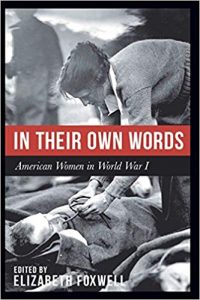Scidmore in Book on Women Writing in WWI
(Reposted from October 14, 2015)
Eliza Scidmore, the subject of my biography in progress, appears in a new book of writings by American women in World War I. Author Elizabeth Foxwell took a very different turn in compiling the anthology.

Author Elizabeth Foxwell reads from her book at One More Page in Arlington, Va. (Photo: Diana Parsell)
Foxwell has spent much of her career immersed in mystery and crime fiction. A true scholar of the genre, she’s won an Agatha Award for her stories, reviews mysteries for Publisher’s Weekly, and is managing editor of Clues: A Journal of Detection
For the anthology, In Their Own Words, Foxwell selected letters, journal entries, and articles to present a cross-section of women’s experiences in World War I.
Eliza Scidmore appears in the book, among a half-dozen female correspondents. She was in Japan in the summer of 1914 when Japan declared war on Germany.
Scidmore published an article in Outlook magazine describing Japan’s entry into the war as an ally of France and Russia. Foxwell read an excerpt from it during an author’s talk last night at One More Page Books in Arlington, Va. That happens to be my local independent bookstore!
Varied Backgrounds
Foxwell said her interest in World War I narratives by American women grew from her interest in Vera Brittain’s Testament of Youth. (Last month I watched the engaging film of the same title during a trans-Atlantic flight.)
Thousands of women served overseas even before America entered the war in 1917, Foxwell noted. They worked under Allied nations and nongovernmental groups, providing medical care and other services.
 Nursing usually comes to mind when people think of women serving in World War I. But Foxwell wanted to show the broad diversity of women and their work in the war, as told from their own perspective. She found the writing selections by scouring a lot of public records and private collections.
Nursing usually comes to mind when people think of women serving in World War I. But Foxwell wanted to show the broad diversity of women and their work in the war, as told from their own perspective. She found the writing selections by scouring a lot of public records and private collections.
The book spotlights canteen workers, librarians, clerks, switchboard operators, Red Cross volunteers, U.S. Navy “yeomanettes,” and a female barnstormer.
View From Japan
Eliza Scidmore spent part of the war in Europe covering Red Cross relief efforts. By the time the war broke out, she had been reporting on and off from the Far East for 30 years. Her 1914 article in the Outlook described developments leading up to the declaration of war by Japan and the weeks that followed.
“Japan joined very slowly and deliberately, evidently reluctantly, bound by her alliance to do whatever requested,” Scidmore wrote. Japanese troops were part of a coalition dispatched to destroy a German railway supply line at Tsingtau and protect British merchant ships in the South Seas.
Scidmore described Japan’s restraint in setting off for war:
“Throughout the whole affair Japan has been calm, quiet, and self-contained — a splendid object-lesson of how to go to war and not lose your head. There was no boasting, no hurrahing, no noisy ‘On to Tsingtau.’ ”
Germany “bitterly resented” Japan’s entry into the war, she wrote, because of “all that Japan owed to Germany in military and medical training, modern science, and art and philosophy.”